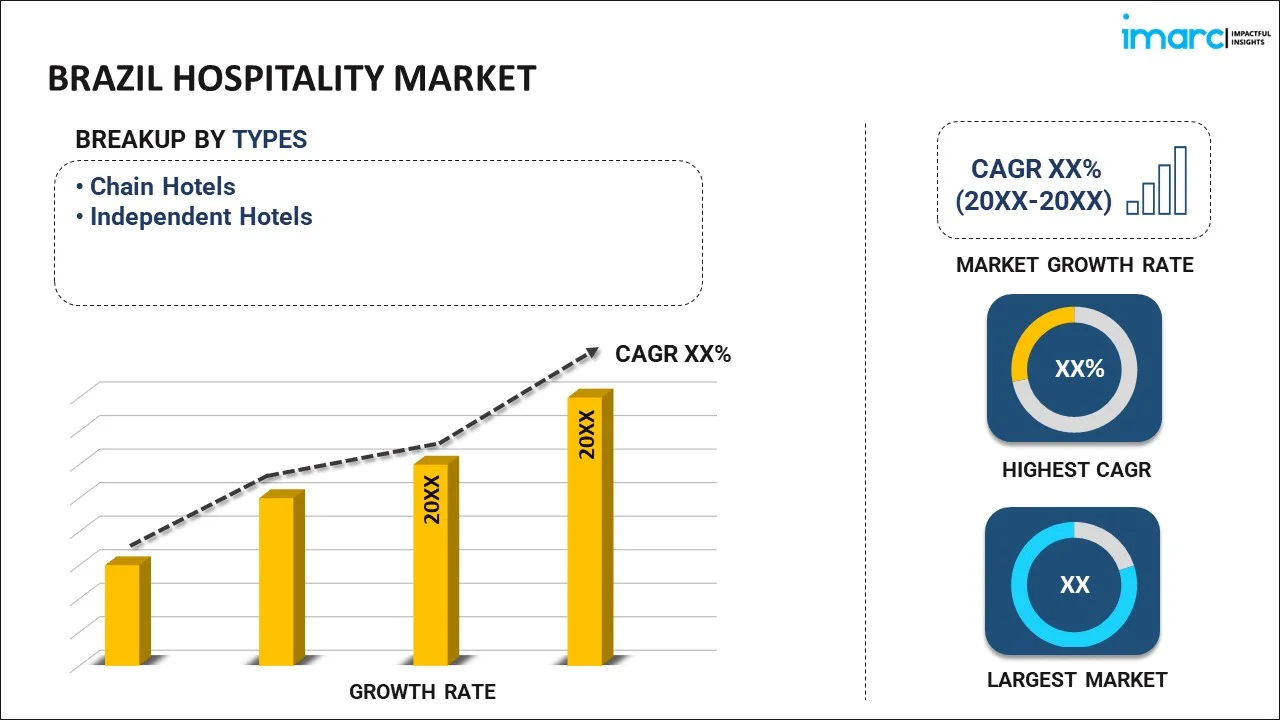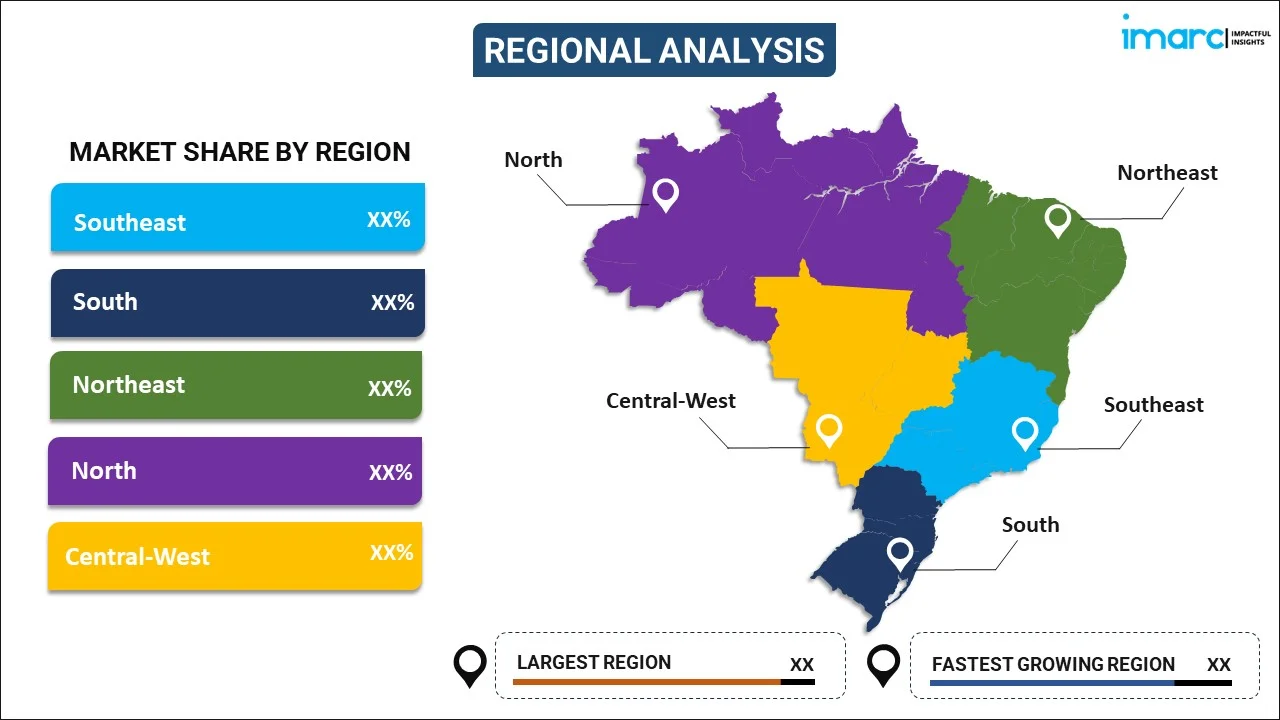
Brazil Hospitality Market Report by Type (Chain Hotels, Independent Hotels), Segment (Service Apartments, Budget and Economy Hotels, Mid and Upper Mid-Scale Hotels, Luxury Hotels), and Region 2025-2033
Brazil Hospitality Market Overview:
Brazil hospitality market size reached USD 37.7 Billion in 2024. Looking forward, IMARC Group expects the market to reach USD 51.4 Billion by 2033, exhibiting a growth rate (CAGR) of 3.51% during 2025-2033. The escalating demand for wellness and health-focused experiences, increasing popularity of the sharing economy among travelers, and rising preferences of travelers for eco-friendly and socially responsible accommodations represent some of the key factors driving the market.
|
Report Attribute
|
Key Statistics
|
|---|---|
|
Base Year
|
2024
|
|
Forecast Years
|
2025-2033
|
|
Historical Years
|
2019-2024
|
|
Market Size in 2024
|
USD 37.7 Billion |
|
Market Forecast in 2033
|
USD 51.4 Billion |
| Market Growth Rate 2025-2033 | 3.51% |
Hospitality refers to the warm and friendly reception, care, and service extended to guests and visitors. It encompasses travel, tourism, events, and healthcare and includes providing comfortable and clean lodgings, such as hotels, motels, or vacation rentals, wherein guests can stay. It offers a variety of dining options like restaurants, room service, and the availability of quality food and drinks. It also involves maintaining a clean and well-maintained environment, including guest rooms, public areas, and facilities. It ensures the safety of guests through measures like security personnel, surveillance, and fire safety protocols. It encompasses assistance with travel arrangements, sightseeing recommendations, transportation, and other guest needs. Moreover, it utilizes advanced technologies for efficient check-in/check-out processes, in-room entertainment, and guest communication.
Brazil Hospitality Market Trends:
Increased Investment
The Brazilian hospitality industry has witnessed substantial growth in capital inflows, with both domestic and international investors focusing on strengthening the country’s lodging and tourism infrastructure. Strategic investments are reshaping the Brazil hotel market, targeting projects that emphasize eco-friendly design, digital services, and wellness-oriented experiences. Investments are not limited to luxury resorts; mid-range and budget hotels are also upgrading their facilities to meet rising consumer expectations. The hotel industry has benefited from a stronger push toward digitization, such as self-check-in kiosks, mobile booking systems, and energy-efficient operations, creating long-term cost advantages. Additionally, investments in airport modernization and regional connectivity are enabling smoother travel experiences, which directly benefit the wider hospitality and tourism ecosystem. Investors are increasingly aligning their portfolios with sustainability benchmarks, introducing renewable energy use and water conservation systems into properties. Private equity and multinational hotel groups are partnering with local operators to expand into secondary cities, tapping into underserved markets with growth potential. These investments are raising service standards, boosting guest confidence, and positioning Brazil as a competitive market for international travelers. Overall, the steady flow of capital continues to redefine the hospitality business, promoting innovation and building resilience across the Brazilian Hospitality landscape.
Rising Occupancy Rates
Occupancy rates in the Brazilian hotel industry have surged in recent years, reflecting stronger domestic demand, improved infrastructure, and increased travel convenience. The post-pandemic recovery period has boosted confidence in both leisure and business travel, leading to fuller bookings across a wide range of properties. Urban expansion and a rising middle class with disposable incomes have fueled demand for mid-range accommodations, while international travelers continue to drive growth in premium and boutique segments. The hotel market is also witnessing robust growth from medical tourism and MICE (Meetings, Incentives, Conferences, and Exhibitions) activities, as healthcare and corporate travelers prefer reliable hospitality services. Technology adoption has supported this trend, with mobile applications and smart hospitality systems streamlining reservations, offering digital concierge services, and enabling dynamic pricing strategies to maximize occupancy. Seasonal tourism spikes, particularly during cultural festivals, sporting events, and beach tourism, further amplify booking volumes across the Brazilian hospitality industry. Budget hotels and alternative accommodations have experienced consistently high utilization, as cost-conscious travelers seek affordable yet high-quality lodging options. Overall, rising occupancy rates reflect not just improved market demand but also strategic operational adjustments by hotels, ensuring the hospitality business remains profitable and competitive in both domestic and global markets.
Growing Tourism / Increased Foreign Visitors
The influx of international tourists has strengthened the foundation of the Brazilian hospitality sector, as enhanced air connectivity and global promotional campaigns have brought new visibility to Brazil as a preferred travel destination. Improvements in airports, road networks, and public transport have encouraged more foreign visitors to explore Brazil’s diverse cultural and natural attractions. The Brazilian hospitality industry has capitalized on this growth by introducing multilingual staff, internationally recognized service standards, and modernized infrastructure to cater to global tourists. The rise in international events, music festivals, and sports tournaments continues to attract large groups of visitors, benefiting both the Brazilian hotel industry and the broader hospitality and tourism ecosystem. Foreign tourists have shown growing interest in eco-resorts, adventure tourism, and cultural experiences, driving demand for sustainable lodging options across Brazil. To further enhance competitiveness, hotels and resorts are increasingly investing in smart hospitality tools such as AI-based recommendations and digital concierge services that meet international expectations. Increased foreign arrivals have also encouraged hospitality operators to diversify their offerings, from luxury to budget-friendly accommodations, ensuring inclusivity across markets. Ultimately, the steady rise in tourism inflows is strengthening Brazil’s global positioning in the hospitality business.
Brazil Hospitality Market Segmentation:
IMARC Group provides an analysis of the key trends in each segment of the market, along with forecasts at the country level for 2025-2033. Our report has categorized the market based on type and segment.
Type Insights:

To get more information on this market, Request Sample
- Chain Hotels
- Independent Hotels
The report has provided a detailed breakup and analysis of the market based on the type. This includes chain hotels and independent hotels.
Segment Insights:
- Service Apartments
- Budget and Economy Hotels
- Mid and Upper Mid-Scale Hotels
- Luxury Hotels
A detailed breakup and analysis of the market based on the segment have also been provided in the report. This includes service apartments, budget and economy hotels, mid and upper mid-scale hotels, and luxury hotels.
Regional Insights:

- Southeast
- South
- Northeast
- North
- Central-West
The report has also provided a comprehensive analysis of all the major regional markets, which include Southeast, South, Northeast, North, and Central-West.
Competitive Landscape:
The market research report has also provided a comprehensive analysis of the competitive landscape in the market. Competitive analysis such as market structure, key player positioning, top winning strategies, competitive dashboard, and company evaluation quadrant has been covered in the report. Also, detailed profiles of all major companies have been provided. Some of the key players include:
- Accor SA
- Intercity Hotels
- Louvre Hotels Group
- Marriott International Inc.
- Nacional Inn - Hotéis e Centros de Convenções
- Windsor Hoteis
- Wyndham Hotel Group
(Please note that this is only a partial list of the key players, and the complete list is provided in the report.)
Brazil Hospitality Market News:
- August 2025: Brazil advanced its hospitality industry development by launching the official COP30 accommodation platform in Belém. The initiative added 2,700 rooms across apartments and private residences, yet highlighted challenges with inflated prices, underscoring the strain on infrastructure and demand during major international events.
- July 2025: Marriott advanced Brazil’s hospitality market development by announcing seven City Express hotels across Pernambuco, Rio Grande do Norte, and Ceará. This marked its entry into the economy and midscale segments, challenging Accor’s dominance and expanding Marriott’s footprint through localized design and strategic partnerships.
Brazil Hospitality Market Report Coverage:
| Report Features | Details |
|---|---|
| Base Year of the Analysis | 2024 |
| Historical Period | 2019-2024 |
| Forecast Period | 2025-2033 |
| Units | Billion USD |
| Scope of the Report | Exploration of Historical Trends and Market Outlook, Industry Catalysts and Challenges, Segment-Wise Historical and Future Market Assessment:
|
| Types Covered | Chain Hotels, Independent Hotels |
| Segments Covered | Service Apartments, Budget and Economy Hotels, Mid and Upper Mid-Scale Hotels, Luxury Hotels |
| Regions Covered | Southeast, South, Northeast, North, Central-West |
| Companies Covered | Accor SA, Intercity Hotels, Louvre Hotels Group, Marriott International Inc., Nacional Inn - Hotéis e Centros de Convenções, Windsor Hoteis, Wyndham Hotel Group, etc. |
| Customization Scope | 10% Free Customization |
| Post-Sale Analyst Support | 10-12 Weeks |
| Delivery Format | PDF and Excel through Email (We can also provide the editable version of the report in PPT/Word format on special request) |
Key Benefits for Stakeholders:
- IMARC’s industry report offers a comprehensive quantitative analysis of various market segments, historical and current market trends, market forecasts, and dynamics of the Brazil hospitality market from 2019-2033.
- The research report provides the latest information on the market drivers, challenges, and opportunities in the Brazil hospitality market.
- Porter's five forces analysis assist stakeholders in assessing the impact of new entrants, competitive rivalry, supplier power, buyer power, and the threat of substitution. It helps stakeholders to analyze the level of competition within the Brazil hospitality industry and its attractiveness.
- Competitive landscape allows stakeholders to understand their competitive environment and provides an insight into the current positions of key players in the market.
Key Questions Answered in This Report
The Brazil hospitality market was valued at USD 37.7 Billion in 2024.
The Brazil hospitality market is projected to exhibit a CAGR of 3.51% during 2025-2033, reaching a value of USD 51.4 Billion by 2033.
The Brazil hospitality market is driven by the increasing demand for wellness focused experiences, growth in the sharing economy, and preference for eco friendly, socially responsible accommodations.
Some of the major players in the Brazil hospitality market include Accor SA, Intercity Hotels, Louvre Hotels Group, Marriott International Inc., Nacional Inn, Windsor Hoteis, Wyndham Hotel Group, etc.
Need more help?
- Speak to our experienced analysts for insights on the current market scenarios.
- Include additional segments and countries to customize the report as per your requirement.
- Gain an unparalleled competitive advantage in your domain by understanding how to utilize the report and positively impacting your operations and revenue.
- For further assistance, please connect with our analysts.
 Request Customization
Request Customization
 Speak to an Analyst
Speak to an Analyst
 Request Brochure
Request Brochure
 Inquire Before Buying
Inquire Before Buying




.webp)




.webp)












